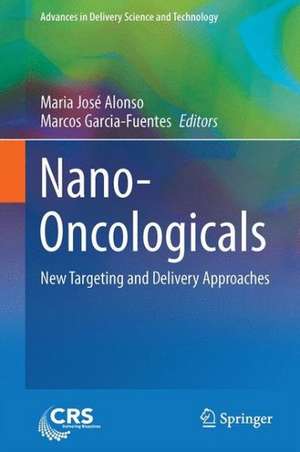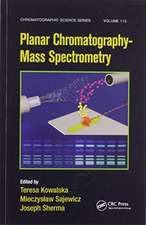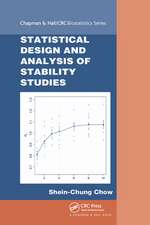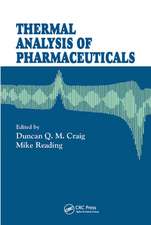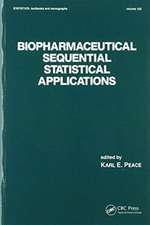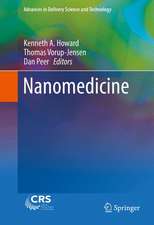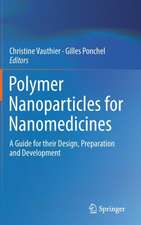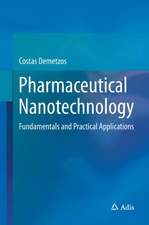Nano-Oncologicals: New Targeting and Delivery Approaches: Advances in Delivery Science and Technology
Editat de Maria José Alonso, Marcos Garcia-Fuentesen Limba Engleză Hardback – 4 noi 2014
Beyond these targeting options, Nano-Oncologicals: New Targeting and Delivery Approaches presents the most recent technological advances in the area of nucleic acid-based therapies, along with those in the area of theranostics, where the design of multifunctional nano carriers becomes vital. Following the study of the most promising nanotechnologies around the development of nano-oncologicals, the book ends with an overview of regulatory and toxicological issues, which are critical in their translational pathway, and the presentation of a nucleic acid-based therapy case-study. This book is an important resource for scientists interested in the design and development of anticancer nanotechnologies and also to those aiming to push their technology through clinical development.
Preț: 959.82 lei
Preț vechi: 1170.51 lei
-18% Nou
Puncte Express: 1440
Preț estimativ în valută:
183.66€ • 192.27$ • 151.97£
183.66€ • 192.27$ • 151.97£
Carte tipărită la comandă
Livrare economică 05-19 aprilie
Preluare comenzi: 021 569.72.76
Specificații
ISBN-13: 9783319080833
ISBN-10: 3319080830
Pagini: 350
Ilustrații: XIV, 473 p. 58 illus., 51 illus. in color.
Dimensiuni: 155 x 235 x 25 mm
Greutate: 0.86 kg
Ediția:2014
Editura: Springer International Publishing
Colecția Springer
Seria Advances in Delivery Science and Technology
Locul publicării:Cham, Switzerland
ISBN-10: 3319080830
Pagini: 350
Ilustrații: XIV, 473 p. 58 illus., 51 illus. in color.
Dimensiuni: 155 x 235 x 25 mm
Greutate: 0.86 kg
Ediția:2014
Editura: Springer International Publishing
Colecția Springer
Seria Advances in Delivery Science and Technology
Locul publicării:Cham, Switzerland
Public țintă
ResearchCuprins
1 Passive vs active targeting: an update of the EPR role in drug delivery to tumors.- 2 The “EX” and the “SOMA”: How they communicate.- 3 Polymeric nano carriers for cancer therapy .- 4 Targeted Liposomes and Micelles as Carriers for Cancer Therapy.- 5 Photodynamic therapy for cancer: principles, clinical applications and nano technological approaches.- 6 Cancer Vaccines: fundamentals and strategies.- 7 Cancer immune modulation and immunosuppressive cells: current and future therapeutic approaches.- 8 Nanotechnology and cáncer immunomodulation.- 9 RNAi-based Nano-Oncologicals – Delivery and Clinical Applications.- 10 Nano-Platforms for Tumor-Targeted Delivery of Nucleic Acid Therapies.- 11 Multifunctional Gold Nano carriers for Cancer Theranostics – From bench to bedside and back again?.- 12 Micro bubbles as Theranostics Agents.- 13 Multimodal Nano-Systems for Cancer Diagnosis, Imaging and Therapy.- 14 Nano toxicology: Towards Safety-by-Design.- 15 Regulatory aspects of oncologicals: nano systems main challenges.- 16 BO-110, a dsRNA-based anticancer treatment.
Notă biografică
María José Alonso is Professor of Biopharmaceutics and Pharmaceutical Technology at the University of Santiago de Compostela (USC) in Spain. She has made critical contributions to the design of novel nanostructures for the targeted delivery of drugs and vaccines and to the understanding of the interaction of nanoparticles with biological barriers. She is part of the scientific boards of a number of societies and the executive board of the Controlled Release Society. She is also a member of the editorial board of eight prestigious journals in the field of drug delivery.
Marcos Garcia-Fuentes is an Associate Professor of Pharmacy at Spain’s University of Santiago de Compostela (USC), where he also obtained his Ph.D. He was a visiting scholar at Purdue University in Indiana, USA and a Marie Curie postdoctoral scientist at ETH Zurich in Switzerland. He was recognized with a competitive contract from the regional government for the reintegration of excellent researchers. Marcos has work in the design of biomaterials and nanostructures for medical applications. His current focus is on nanomedicines and biomaterials for modulating progenitor cells and cancer stem cells.
Marcos Garcia-Fuentes is an Associate Professor of Pharmacy at Spain’s University of Santiago de Compostela (USC), where he also obtained his Ph.D. He was a visiting scholar at Purdue University in Indiana, USA and a Marie Curie postdoctoral scientist at ETH Zurich in Switzerland. He was recognized with a competitive contract from the regional government for the reintegration of excellent researchers. Marcos has work in the design of biomaterials and nanostructures for medical applications. His current focus is on nanomedicines and biomaterials for modulating progenitor cells and cancer stem cells.
Textul de pe ultima copertă
This authoritative volume focuses on emerging technologies in cancer nanomedicine, characterized by their multi-functionality and potential to address simultaneously diverse issues of clinical relevance in the treatment of cancer. The book consists of sixteen chapters divided into six sections: 1) Biological Barriers in Cancer; 2) Tumor Targeting; 3) Targeting the Immune System; 4) Gene Therapy; 5) Nanotheranostics; and 6) Translational Aspects of Nano-Oncologicals. The volume starts with an introduction describing the biological barriers associated with cancer therapy and highlighting ways to overcome such barriers through the use of nanotechnology. This is followed by an analysis of the two major targeting strategies currently under investigation in cancer therapy: namely, the targeting of cancer cells and the targeting of the immune system. In the first case, the book presents liposomal and polymer-based therapies, including photodynamic approaches. In the second case, it analyzes in detail the possibility of either improving the efficiency of the immune system toward preventing cancer progression (cancer immunomodulation) or generating responses against specific cancer antigens (cancer vaccines).
Beyond these targeting options, Nano-Oncologicals: New Targeting and Delivery Approaches presents the most recent technological advances in the area of nucleic acid-based therapies, along with those in the area of theranostics, where the design of multifunctional nanocarriers becomes vital. Following the study of the most promising nanotechnologies around the development of nano-oncologicals, the book ends with an overview of regulatory and toxicological issues, which are critical in their translational pathway, and the presentation of a nucleic acid-based therapy case-study. This book is an important resource for scientists interested in the design and developmentof anticancer nanotechnologies and also to those aiming to push their technology through clinical development.
Beyond these targeting options, Nano-Oncologicals: New Targeting and Delivery Approaches presents the most recent technological advances in the area of nucleic acid-based therapies, along with those in the area of theranostics, where the design of multifunctional nanocarriers becomes vital. Following the study of the most promising nanotechnologies around the development of nano-oncologicals, the book ends with an overview of regulatory and toxicological issues, which are critical in their translational pathway, and the presentation of a nucleic acid-based therapy case-study. This book is an important resource for scientists interested in the design and developmentof anticancer nanotechnologies and also to those aiming to push their technology through clinical development.
Caracteristici
Establishes a comprehensive background to any scientist entering the field of cancer nano medicine Revises novel anticancer strategies including targeted therapies, immunomodulation and emerging therapeutic technologies Focuses several chapters on translational aspects for nano-oncologicals, reviewing first-hand experiences from companies working on this area
